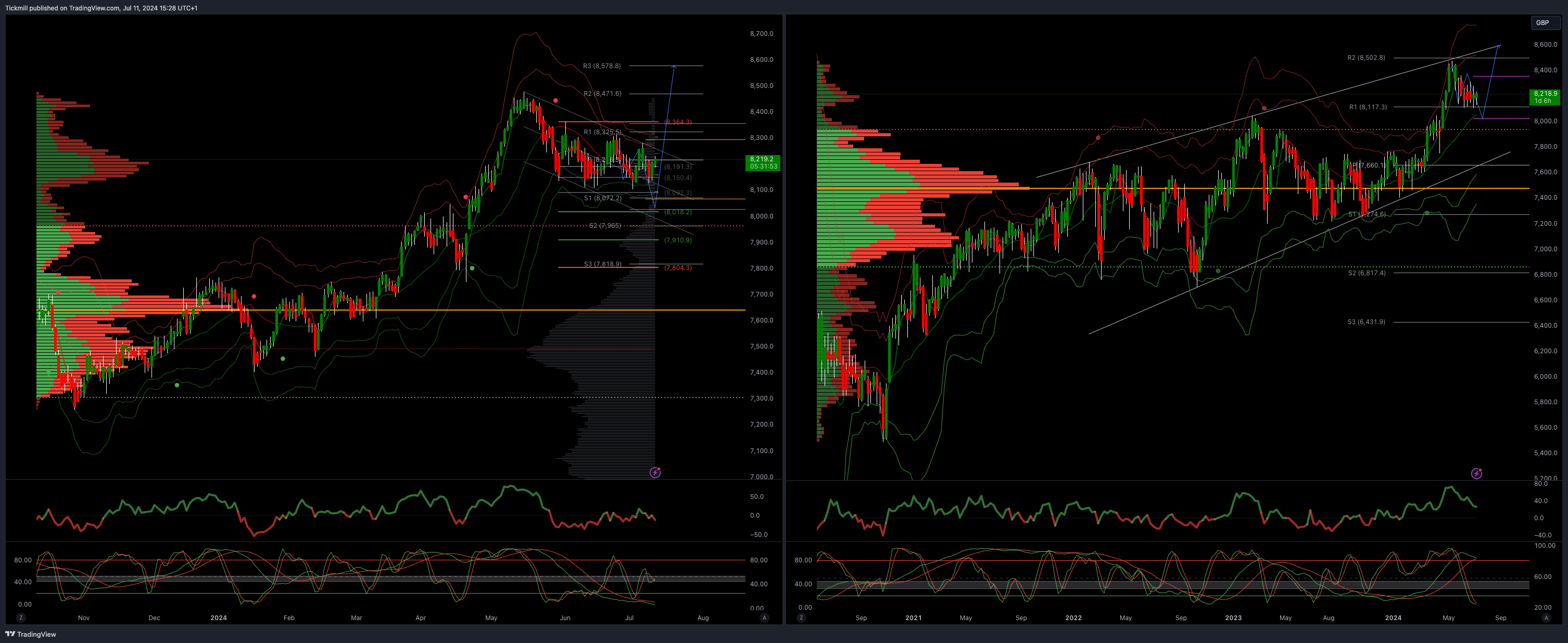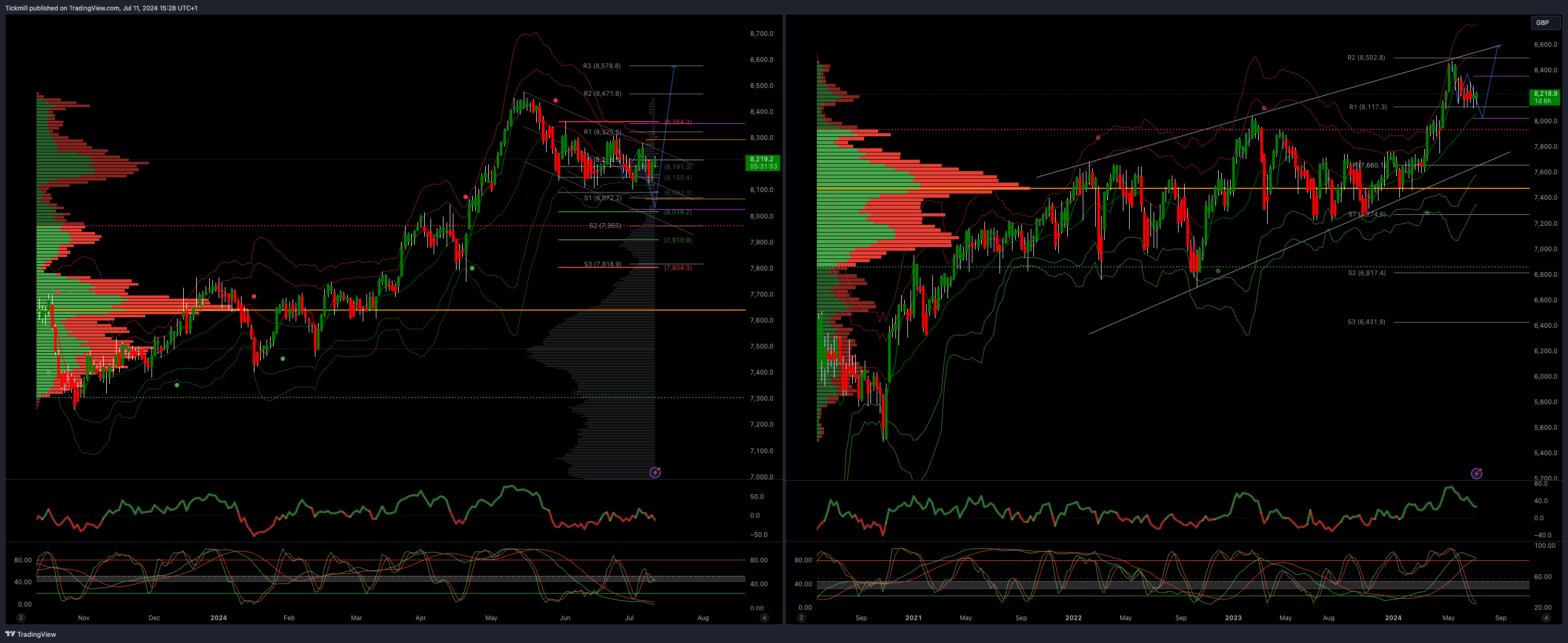The FTSE Finish Line - July 11 - 2024

The FTSE Finish Line - July 11 - 2024
FTSE Flatlining As Markets Mull Continued US Inflation Pullback
On Thursday, UK stocks remained steady as losses in aerospace and defence shares balanced out gains in other sectors. Investors kept an eye on U.S. inflation data for insights into the Federal Reserve's interest rate strategy, which has rapidly repriced for a September rate cut given another decline in inflation. The FTSE 100 index stayed relatively unchanged +0.2%, while the FTSE 250 index dipped. In the meantime, May's economic growth in the UK surpassed expectations, possibly reducing the likelihood of an August rate reduction. Following this data, the sterling reached its highest level in four months. Additionally, Goldman Sachs revised the country's GDP growth forecast from 1.1% to 1.2% for the year. Gold prices rose, leading to a 0.1% increase in heavyweight precious metal miners. However, aerospace and defence stocks declined by 0.7%, while construction materials companies were down by 0.5%.
Moonpig Group, a British greeting card retailer, saw its shares fall by 7.4% to 187.6p, making it the top percentage loser on the FTSE midcaps index. This drop comes as the company's shareholders sold 35 million shares at a discounted price of 175p apiece, representing a discount of about 13.4% to the last closing price. Among the selling shareholders are Exponent Private Equity and Blackstone Group. Despite this decline, the stock has seen a 19% increase so far this year, but its six-session gaining streak is at risk of being snapped if the current trend continues.
UK bootmaker Dr. Martens has seen its shares rise by 3.5% to 76.20p, making it one of the top gainers on the FTSE 250 index. The company has reported that its trading since the start of the financial year has been in line with expectations and that the current fiscal year will be second-half weighted, particularly from a profit perspective. Dr. Martens has stated that its FY25 guidance remains unchanged and it continues to target positive direct-to-consumer growth in the U.S. in the second half of the year. In May, the company announced cost-cutting plans in response to financial pressure and dwindling demand in the U.S., its biggest market. Despite these challenges, the stock is up approximately 14% year-to-date.
Wood Group, a UK-based multinational engineering and consulting firm, saw its shares slip by 1.3% to 203.2 pence after reporting a 6% drop in half-year revenue to $2.8 billion. The company, however, maintains its outlook for fiscal year 2024 and 2025. Jefferies commented that there is no apparent reason to change the 230p cash offer from Dubai-based engineering and consulting firm Sidara, which values Wood Group at 1.56 billion pounds ($2 billion). Wood Group had extended Sidara's deadline to make a firm offer for the company on July 3. The stock is up 20.4% year-to-date as of the last close.
Technical & Trade View
FTSE Bias: Bullish Above Bearish below 8225
Above 8363 opens 8500
Primary support 8000
Primary objective 8023
5 Day VWAP bullish
20 Day VWAP bullish

Disclaimer: The material provided is for information purposes only and should not be considered as investment advice. The views, information, or opinions expressed in the text belong solely to the author, and not to the author’s employer, organization, committee or other group or individual or company.
Past performance is not indicative of future results.
High Risk Warning: CFDs are complex instruments and come with a high risk of losing money rapidly due to leverage. 72% and 73% of retail investor accounts lose money when trading CFDs with Tickmill UK Ltd and Tickmill Europe Ltd respectively. You should consider whether you understand how CFDs work and whether you can afford to take the high risk of losing your money.
Futures and Options: Trading futures and options on margin carries a high degree of risk and may result in losses exceeding your initial investment. These products are not suitable for all investors. Ensure you fully understand the risks and take appropriate care to manage your risk.
Patrick has been involved in the financial markets for well over a decade as a self-educated professional trader and money manager. Flitting between the roles of market commentator, analyst and mentor, Patrick has improved the technical skills and psychological stance of literally hundreds of traders – coaching them to become savvy market operators!
